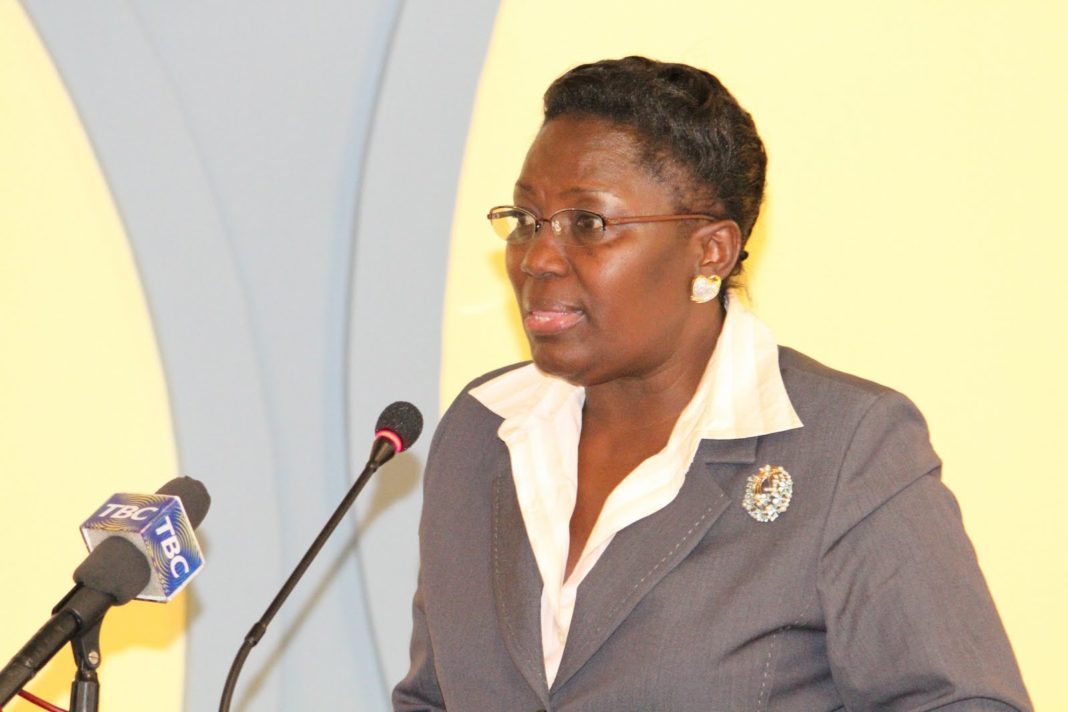BY: Georgia Tumwesigye and Patricia Munabi Babiiha
With only one woman occupying a position among the top 7 offices in the land, gender equality remains a myth as Ugandan women are shunted to periphery while men continue occupying offices that move and shake things in the country. Two studies by the Forum for Women in Democracy (FOWODE) titled, “Reality Check:
Women in Leadership Positions in Uganda,” that interrogates the position of women in the public sector and, “Women Shattering the Glass Ceiling: Experiences from the 2016 Elections in Uganda,” have been quite eye opening reading on the status of women in the country.
According to Uganda’s Order of Precedence as set out in the Constitution and the protocol guidebook published by the Ministry of Public Service, Uganda’s top Seven offices are President, Vice President, Speaker of Parliament, Chief Justice, Deputy Speaker of Parliament , Deputy Chief Justice and the Prime Minister.
All those offices, with the exception of the Speaker, are occupied by men.
To further contextualise the magnitude of this marginalisation, it is important to note that positions like that of Prime Minister, President and Chief Justice, have never been occupied by a woman.
That speaks volumes about the perceptions surrounding women and the roadblocks they face when they attempt to challenge the status quo by going for the top offices in the land rather than settling for the crumbs thrown at them.
When Ms Miria Kalule Obote declared that she would be running for the presidency in the 2006 General Elections, becoming the first woman to run for the presidency, she was in effect upsetting the applecart, triggering an avalanche of snide remarks.
Other women who have given a shot at the presidency have been dismissed as sideshows, as Maureen Kyalya, who contested in the 2016 General elections can attest.
And where women have been given a chance to occupy top positions, they have undoubtedly impressed in the fight to ensure gender equity and equality.
As Speaker of Parliament, Ms Rebecca Kadaga has been at the forefront of ensuring legislation and policies that are crucial in the fight for the space of Ugandan women.
Some of the critical pro-women legislation that has been passed under the leadership of Speaker Kadaga include the Prohibition of Female Genital Mutilation Act; a piece of law that criminalises the barbaric act of cutting female genitalia.
Ms Kadaga also led Parliament in ensuring that the Public Finance Management Act has a clause stipulating that all Ministries, Departments and Agencies (MDAs) must have a Certificate of Gender Equity and compliance (CGE) before their budgets are passed.
The Certificate of Gender equity and compliance is an important piece of legislation because it requires MDAs to meet a 50% score of gender and equity budgeting before their budgets are passed by Parliament. The rating for CGE is conducted by the Equal Opportunities Commission (EOC).
Ms Kadaga has been pulling all stops to have the Marriage and Divorce Bill passed but the legislation has faced staunch opposition from the Executive, meaning that Parliament still faces an uphill task to have the Bill passed.
Women MPs, backed by Ms Kadaga, have also been very vocal about the need to change succession laws in Uganda to amend legislations that impede the protection of the rights of women and the girl child’s right to inherit the property of a deceased relative.
The Succession Amendment Bill (2018) and the Sexual Offences Bill (2015) are two important legislations that were drafted to eliminate these and other negative laws but attempts to amend them have faced stiff opposition from the Executive.
Ms Kadaga has also been a key supporter of the Uganda Women Parliamentary Association (UWOPA), a parliament caucus comprising of all women MPs but open to male members as associates or honorary members.
Formed during the National Resistance Council (NRC) in 1989, UWOPA has been very critical in fighting for legislation and policies that advance the cause of women empowerment.
As Deputy Chief Justice, Her Lordship Laeticia Kikonyogo (RIP), who doubled as the Head of the Constitutional Court, also excelled well in her other judicial duties. She is the only woman to have ever served as Deputy Chief Justice.
As Vice-President, Specioza Wandira Kazibwe was very passionate about matters affecting women, choosing to take on the bull by its horns and openly speak about issues that affect women using very unequivocal language.
In her controversial way, Ms Wandira Kazibwe spoke out against polygamy, especially in the Islamic religion where it is more entrenched, cheekily arguing that muslim men who marry four women cannot satisfy them and therefore force them to cheat.
During her tenure as Vice-President, Ms Wandira Kazibwe was also very vocal on the issue of domestic violence, urging women to train in martial arts in order to defend themselves from their violent husbands
Among the women that have occupied top positions, it is perhaps Speaker Rebecca Kadaga who has run into stronger headwinds in taking up an office previously ‘ring-fenced’ for men.
Ms Kadaga has not shied away from challenging men to maintain her position, further giving women down the leadership ladder hope that there is always light at the end of the tunnel.
To win the race for Speaker in the 2011 elections, Ms Kadaga defeated opposition kingpin Nathan Nandala Mafabi (FDC Budadiri West) and in 2016, she had to put up a strong fight to secure the nomination from the National Resistance Movement (NRM), winning a spirited challenge from Deputy Speaker Jacob Oulanyah.
The crisis of lack of women at the top ladder of the leadership of the three arms of government is best captured by a newly released report by the Forum for Women in Democracy in Uganda (FOWODE), a non-partisan women organisation.
The report titled: Reality Check: Women in Leadership Positions in Uganda, which is a second edition of one that was first published four years ago, notes that with only one woman out of the 7 heads of the three arms of government, Uganda remains stuck with “male-centered leadership”.
“Just as it was four years ago, only 1 out of the three heads of arms of government is a woman. At the level of the deputies of heads of Executive, Judiciary, and Legislature, women representation remains non-existent. This image of male-centered political leadership is ingrained and normalized in leadership cultures of other public and private institutions, as this report will demonstrate later, “reads the report.
The report puts particular emphasis on how critical it is for Speaker Rebecca Kadaga to be the lone woman in a male dominated leadership of the three arms of government.
It notes that: “It is notable that although women remain marginal at this level of leadership, the choice of a female Speaker as the head of one of the three arms of government is an important step towards having women in critical leadership positions.”
“Having served as a Deputy Speaker of Parliament and now in her second 5-year term as the speaker of the House, Ms Rebecca Kadaga remains the most senior ranking woman in the country. Her presence is a pointer to women’s ability to lead in top leadership, despite many forms of resistance they encounter along their managerial paths,” says the report.
The report also hailed the Speaker also lauded the Speaker for leading reforms in the Parliamentary rules of procedure to promote gender balance in the leadership of committees of Parliament.
As the report notes, the“institutionalized masculine norm in the three arms of government” is best illustrated by images captured at important state functions like Budget Day and the State of the Nation Address.
The image of President Museveni alongside Chief Justice Bart Katureebe, Speaker Rebecca Kadaga, Deputy Speaker Jacob Oulanyah, Prime Minister Ruhakana Rugunda and Deputy Chief Justice Owiny-Odollo sends a powerful message; without women at the top, the fight for gender equity has just started.
For the MDAs,it is one step forward, two backward
Though progress has been made in attempts to have women occupy leadership positions in Ministries, Departments and Agencies (MDAs), there is still a lot of work to do if the gap between men and women in leadership is to be narrowed further.
A new report titled: Reality Check: Women in Leadership positions in Uganda, shines a spotlight on how women are faring in Uganda’s leadership positions in MDAs, contrasting the current situation with 2014, when a similar study was last conducted.
The report was conducted by the Forum for Women in Democracy (FOWODE), a non-partisan organisation fighting for women empowerment in Uganda.
In majority of the MDAs, women remain relegated to junior-level positions, and, as the report points out, the “absence of women at these [top] managerial levels negatively impacts women’s participation in critical decision-making fora of ministries.”
Though, as the report reveals, it is not all dark and gloom for the fight for gender equity and equality, it is not lost on anyone that despite the laudable baby steps that have been taken to ensure that women are on the same footing with men in terms of leadership in MDAs, the war yet to be won.
Sadly, the report found out that on average, female staff representation in the 18 ministries that were studied in 2014 stood had reduced by 2% from 39% in 2014 to 37% in 2018.
Despite slight improvements in the composition of women in some individual ministries, there were no deliberate and systematic attempts to recruit female staff to bridge the gender gaps in human resources, explains the report.
The writers, Georgia Tumwesigye is the Programme Officer, Women and Leadership Programme [WLP] Forum for Women in Democracy (FOWODE) while Patricia Munabi Babiiha is the Executive Director, FOWODE.







